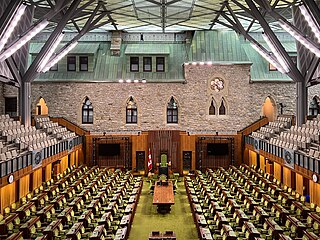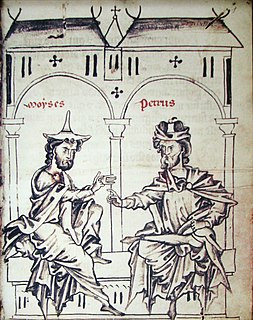
The House of Commons is the lower house of the Parliament of the United Kingdom. Like the upper house, the House of Lords, it meets in the Palace of Westminster in London, England.

The House of Commons of Canada is the lower house of the Parliament of Canada. Together with the Crown and the Senate of Canada, they comprise the bicameral legislature of Canada.

Buoyancy, or upthrust, is an upward force exerted by a fluid that opposes the weight of a partially or fully immersed object. In a column of fluid, pressure increases with depth as a result of the weight of the overlying fluid. Thus the pressure at the bottom of a column of fluid is greater than at the top of the column. Similarly, the pressure at the bottom of an object submerged in a fluid is greater than at the top of the object. The pressure difference results in a net upward force on the object. The magnitude of the force is proportional to the pressure difference, and is equivalent to the weight of the fluid that would otherwise occupy the submerged volume of the object, i.e. the displaced fluid.

Debate is a process that involves formal discourse on a particular topic, often including a moderator and audience. In a debate, arguments are put forward for often opposing viewpoints. Debates have historically occurred in public meetings, academic institutions, debate halls, coffeehouses, competitions, and legislative assemblies. Debate has also been conducted for educational and recreational purposes, usually associated with educational establishments and debating societies. These debates put an emphasis upon logical consistency, factual accuracy, and emotional appeal to an audience. Modern forms of competitive debate also include rules for participants to discuss and decide upon the framework of the debate.

The House of Representatives is the sole chamber of the New Zealand Parliament. The House passes laws, provides ministers to form Cabinet, and supervises the work of government. It is also responsible for adopting the state's budgets and approving the state's accounts.
Policy debate is an American form of debate competition in which teams of two usually advocate for and against a resolution that typically calls for policy change by the United States federal government. It is also referred to as cross-examination debate because of the 3-minute questioning period following each constructive speech. Evidence presentation is a crucial part of Policy Debate. The main argument being debated during a round of Policy is which team wins a system by which the debate should be evaluated (Framework) and who wins under this framework. When a team explains why their impacts are "greater" than the opposition's impacts, they utilize the concept of "impact calculus." One team’s job is to argue that the resolution— the statement that we should make some specific change to address a national or international problem —is a good idea. Affirmative teams generally present a plan as a proposal for implementation of the resolution. On the other hand, the Negative teams present arguments against the implementation of the resolution. In a single round of debate competition, each person gives two speeches. The first speech each person gives is called a “constructive” speech, because it is the speech where each person constructs the basic arguments they will make throughout the debate. The second speech is called a “rebuttal”, because this is the speech were each person tries to rebut the arguments made by the other team, while using their own arguments to try to convince the judge to vote for their team. The Affirmative has to convince the judge to vote for a change, while the Negative has to convince the judge that the status quo is better than the hypothetical world in which the Affirmative's plan is implemented.

The Dewan Rakyat is the lower house of the bicameral Parliament, the federal legislature of Malaysia. The chamber and its powers are established by Article 44 of the Constitution of Malaysia. The Dewan Rakyat sits in the Houses of Parliament in Kuala Lumpur, along with the Dewan Negara, the upper house.
Congressional Debate is a competitive interscholastic high school debate event in the United States. The National Speech and Debate Association (NSDA), National Catholic Forensic League (NCFL) and many state associations and national invitational tournaments offer Congressional Debate as an event. Each organization and tournament offers its own rules, although the National Speech and Debate Association has championed standardization since 2007, when it began to ask its districts to use one of a number of procedures for qualification to its National Tournament. The Pakistan Student Congress event is a conference, and not interscholastic competition.

An audience is a group of people who participate in a show or encounter a work of art, literature, theatre, music, video games, or academics in any medium. Audience members participate in different ways in different kinds of art. Some events invite overt audience participation and others allow only modest clapping and criticism and reception.
Original Oratory is a competitive event in the National Speech and Debate Association, Stoa USA, National Catholic Forensic League, and other high school forensic competitions in which competitors deliver an original, factual speech on a subject of their choosing. Though the rules for the category change from organization to organization, a speech must generally be written and memorized by the performer and should be no more than ten minutes in length, and at most only 150 words can be quoted. The finished speech must be approved by the National Speech and Debate Association. This speech is frequently highly persuasive and is normally about a slightly controversial topic. An orator is given free choice of subject and judged solely on the effectiveness of development and presentation.

Speech balloons are a graphic convention used most commonly in comic books, comics, and cartoons to allow words to be understood as representing a character's speech or thoughts. A formal distinction is often made between the balloon that indicates speech and the one that indicates thoughts; the balloon that conveys thoughts is often referred to as a thought bubble or conversation cloud.
Inventio, one of the five canons of rhetoric, is the method used for the discovery of arguments in Western rhetoric and comes from the Latin word, meaning "invention" or "discovery". Inventio is the central, indispensable canon of rhetoric, and traditionally means a systematic search for arguments.
Dispositio is the system used for the organization of arguments in the context of Western classical rhetoric. The word is Latin, and can be translated as "organization" or "arrangement".

The Hellenic Parliament, also known as the Parliament of the Hellenes, the Hellenic Bouleterion or Greek Parliament, is the unicameral legislature of Greece, located in the Old Royal Palace, overlooking Syntagma Square in Athens. The parliament is the supreme democratic institution that represents the citizens through an elected body of Members of Parliament (MPs).
World Schools Style debating is a combination of the British Parliamentary and Australia-Asian debating formats, designed to meet the needs of the World Schools Debating Championships tournament. Each debate comprises eight speeches delivered by two teams of three members, representing the Proposition and Opposition sides. The first six speeches are eight minutes in duration, with each team then finishing up by giving a four-minute concluding reply speech. Teams are given 30 to 60 minutes to prepare for their speeches.
Australia–Asia Debate, sometimes referred to as Australasian Debating or Australs Style, is a form of academic debate. In the past few years, this style of debating has increased in usage dramatically throughout both Australia and the Asian region, but in the case of Asian countries including Singapore, Malaysia, and the Philippines, the format is also used alongside the British Parliamentary Format. The context in which the Australia-Asia style of debate is used varies, but it is commonly used in Australia at the primary and secondary school level, ranging from small informal one-off intra-school debates to larger more formal inter-school competitions with several rounds and a finals series which occur over a year. It is also commonly used at university level.
A re-recording mixer in North America, also known as a dubbing mixer in Europe, is a post-production audio engineer who mixes recorded dialogue, sound effects and music to create the final version of a soundtrack for a feature film, television program, or television advertisement. The final mix must achieve a desired sonic balance between its various elements, and must match the director's or sound designer's original vision for the project. For material intended for broadcast, the final mix must also comply with all applicable laws governing sound mixing.
Public debate may mean simply debating by the public, or in public. The term is also used for a particular formal style of debate in a competitive or educational context. Two teams of two compete through six rounds of argument, giving persuasive speeches on a particular topic.
Nickelodeon All-Star Challenge is a three-episode game show television special that aired during The Big Help on October 3, 1994.
Japanizi "Going, Going, Gong!" ("ゴーイング、ゴーイング、ゴング!") is a Canadian children's physical game show with a Japanese motif where contestants compete with a teammate against other teams as they tackle obstacles and challenges to test their mental capabilities, strength, endurance, and smarts. The series first aired on YTV starting 5 November 2013 and in the United States on Disney XD as of 4 November 2013.









